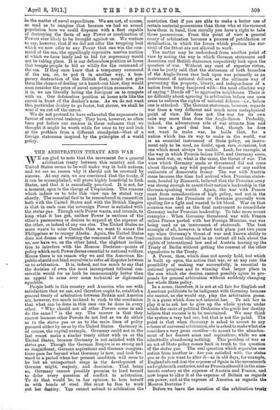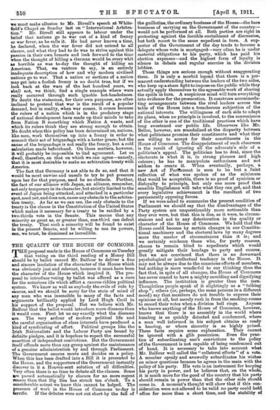THE ARBITRATION TREATY AND WAR W E are glad to note
that the movement for a general arbitration treaty between this country and the United States seems to be well under way in both nations, and we see no reason why it should not be crowned by success. At any rate, we are convinced that the treaty, if it can be accomplished, will prove highly beneficial to both States, and that it is essentially practical. It is not, for a moment, open to the charge of Utopianism. The reasons which induce us to take this view can be stated very shortly. The essential fact to be remembered in connection both with the United States and with the British Empire is that in each case the sovereign Power is satisfied with the status quo. Though each Power wants, and intends, to keep what it has got, neither Power is envious of the other's possessions or desires to expand at the expense of the other, or indeed of any one else. The United States no more wants to seize Canada than we want to annex the Philippines er to occupy Alaska. Again, the United States does not dream of wresting the command of the sea from us, nor have we, on the other hand, the slightest inclina- tion to interfere with the Monroe Doctrine—points of policy which each Power deems essential to national welfare. Hence there is no reason why we and the American Re- . public should not bind ourselves to refer all disputes between us to arbitration. It is, indeed, not too much to say that the decision of even the most incompetent tribunal con- ceivable would for us both be immeasurably better than an appeal to arms over some technical or diplomatic squabble. People both in this country and America, who see with satisfaction that we can, and therefore ought to, establish a general treaty of arbitration between Britain and America are, however, too much inclined to rush to the conclusion that what can be done in this case can be done in every other. " Why should not all other Powers come in and do the same ? " is the cry. The answer is that they cannot because other Powers do not feel as we do either as to the status quo or as to the main lines of policy pursued either by us or by the United States. Germany is, of course, the capital example. Germany could not in the last resort make a similar treaty either with us or the United States, because Germany is not satisfied with the status quo. Though the German Empire is so strong and so magnificent, German aspirations and German imagina- tions pass far beyond what Germany is now, and look for- ward to a period when her present condition will seem to be but an unimportant stage in the development of German might, majesty, and dominion. That being so, Germany cannot possibly promise to bind herself to defer every question of conflict to arbitration. To do that would be, in her opinion, to hem herself in with bonds of steel. She must be free to work out her deatiny. Yau cannot submit to arbitration the conviction that if you are able to make a. better use of certain material possessions than those who at the moment have them in hand, then morally you have a right to take those possessions. From this point of view a general treaty of arbitration becomes a process of petrifaction or sterilisation, in which the forces which produce the sur- vival of the fittest are not allowed to work.
The matter may be understood from another point of view by noting the way in which German statesmen and American and British statesmen respectively look upon the question of war. Without any cant of superior virtue, it can be justly said that the statesmen of both branches of the Anglo-Saxon race look upon war primarily as an instrument of national defence, as the ultimate way of preventing the property, liberty, and independence of a nation from being tampered with—the most effective way of saying " Hands off " to aggressive neighbours. There is no difficulty about agreeing to arbitration before one uses arms to enforce the rights of national defence—i.e., before one is attacked. The German statesman, however, regards war from a very different and much more metaphysical point of view. He does not like war for its own sake any more than does the Anglo-Saxon. Probably, indeed, the adventurous side of war attracts him and his race a good deal less. But, though he does not want to make war, he holds that, for a nation which has its way to make in the world, war is an essential instrument of State policy, an instru- ment only to be used, no doubt, upon rare occasions, but one which must always be usable. Look, for example, at the way in which Prussia before 1870, and Germany since, has used war, or, what is the same, the threat of war. The wars which Germany made or threatened did not come about through any wild popular demand or any sudden outbursts of democratic frenzy. The war with Austria came because the time had arrived when Prussian states- men, headed by Bismarck, believed that the Prussian army was strong enough to assert their nation's leadership in the German-speaking world. Again, the war with France came from considerations of high policy, and not in the least because the Prussians or Germans generally were spoiling for a fight and wanted to let blood. War on that occasion was used as the final instrument to consolidate Germany under Prussian leadership. To take more recent examples : When Germany threatened war with France unless France parted with her Foreign Minister, war was being used as an instrument of statecraft. The best example of all, however, is what took place just two years ago when Germany's threat of war and known ability to enforce the threat silenced in an instant all talk about the rights of international law and of Austria tearing up the Treaty of Berlin without getting the consent of the other signatories to the Treaty. A Power, then, which does not merely hold, but which is built up upon, the notion that war, or at any rate the possibility of making war successfully, is essential to national progress and to winning that larger place in the sun which she desires, cannot possibly agree to pro- posals for general arbitration without suddenly changing her whole State policy.
In a sense, therefore, it is not at all fair for English and American publicists to be indignant with Germany because she cannot, as she would say, play the arbitration game. It is a game which does not interest her. To ask her to play it is to ask her to give up the whole system under which the caste of political Brahmins who guide her destiny believe that success is to be maintained. We may think the system a very bad one, but that is not the point. The point is that when Germany is asked to assent to any scheme of universal arbitration, she is asked to make what she considers a very great sacrifice—to assent to the abandon- ment of her dearest aims and aspirations, while we are admittedly abandoning nothing. This problem of war as an act of State policy comes back in truth to the question of the status quo. The real question which separates one nation from another is : Are you satisfied with the status quo or do you want to alter it—as in old days, for example, Englandaltered it at the expense of Spain in the seventeenth and e ighteenth centuries, and as Prussia altered it in the nine- teenth century at the expense of Austria and France, and now hopes to alter it at the expense of Britain as regards sea power, and at the expense of America as regards the Monroe Doctrine ?
Before WQ._ leaye the auestion of the arbitration treat( we must make allusion to Mr. Birrell's speech at White- field's Chapel on Sunday last on " International Arbitra- tion." Mr. Birre11 still appears to labour under the belief that nations go to war out of a kind of frenzy or war fever, as he calls it. He had never known a time, he declared, when the war fever did not extend to all classes, and what they had to do was to strive against this passion in their own breasts and look forward to the time when the thought of killing a German would be every whit as horrible as was to-day the thought of killing an American. That, we venture to say, is an entirely inadequate description of how and why modern civilised nations go to war. That a nation or sections of a nation may get into a foolish frenzy is no doubt true, but if we look back at the wars of the last hundred years, we shall not, we think, find a single example where wars really occurred through such ignoble hot-headedness. No doubt the statesmen, for their own purposes, are often inclined to pretend that war is the result of a popular demand, but in reality, when war comes, it comes because the rulers of a nation which is in the predatory stage of national development have made up their minds to take from Nation B something which Nation A wants, and which its rulers think they are strong enough to obtain. No doubt when this policy has been determined on, nations, like men, work themselves up into a frenzy in order to commit their act of brigandage with a better grace; but the cause of the brigandage is not really the frenzy, but a cold calculation made beforehand. On these matters, however, it will probably be impossible to find agreement. Let us dwell, therefore, on that on which we can agree—namely, that it is most desirable to make an arbitration treaty with America.
The fact that Germany is not able to do so, and that it would be most unwise and unsafe to try to put pressure upon her for that purpose, need be no obstacle. Further, the fact of our alliance with Japan, an alliance, remember, not only temporary in its character, but strictly limited to the event of Japan being attacked, and attacked in a particular spot, need not, and does not, cause any obstacle to the arbitra- tion treaty. As far as we can see, the only obstacle to the treaty is the clause in the Constitution of the United States which makes it necessary for a treaty to be ratified by a two-thirds vote in the Senate. This means that any minority as great as, or greater than, one-third can defeat the treaty. That such a minority will be found to exist in the present Senate, and be willing to use its powers, can, we trust, be dismissed as incredible.











































 Previous page
Previous page